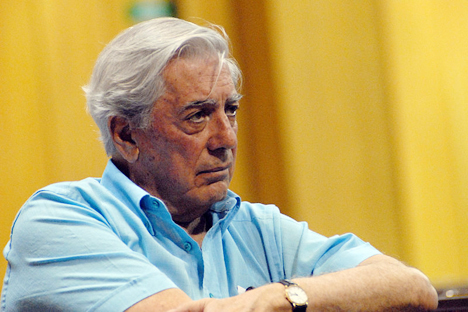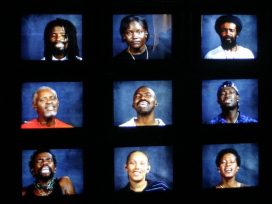Mario Vargas Llosa: La civilización del espectáculo is an attempt to express a feeling of concern, an anguish of sorts, on seeing what we understood by “culture” when I was young, changing during my lifetime into something very different, something essentially distinct from what we understood by “culture” in the 1950s, ’60s and ’70s. The book attempts to describe this transformation and examine the effects of the vagaries of what we call culture today on different aspects of human activity – social, political, religious, sexual and so on – given that culture is something that impregnates all we do in life.
The book doesn’t set out to be pessimistic, but it does aim to be disturbing and to encourage people to think about whether the hegemonic role entertainment and distraction have assumed in our time have also caused them to become central to cultural life. I believe that this is the case and that it has happened with the blessing of wide sections of society, including those who traditionally have represented society’s institutions and cultural values.

Mario Vargas Llosa, 23 February 2011. Photo: Pontificia Universidad Católica de Chile. Source:Wikimedia
In my view, Gilles Lipovetsky is one of the thinkers today to have analysed this new culture in the greatest depth and with the utmost rigour. In his book The Empire of Fashion: Dressing Modern Democracy, he has expertly described what this new culture consists of. Unlike me, he has approached it without anxiety, without an undue sense of alarm, but with sympathy, seeing in it features he considers highly positive. For example, the democratizing effect of a culture that extends to everyone, a culture that, unlike traditional culture, doesn’t make distinctions, is not monopolized by an elite, by coteries of scholars or intellectuals, but permeates the whole of society in one way or another.
He also says, and it’s an interesting and debatable point, that this culture has led to greater individual freedom. Unlike in the past – when the individual was, in a way, the prisoner, the expression, of a culture – individuals today can choose between a wide range of cultural possibilities, thus exercising not only their sovereignty and free will, but also their taste and personal inclinations. He argues that this culture is one that permits people to seek their pleasure in activities that are categorized as cultural but that in the past wouldn’t have been considered as such. These ideas are debatable: at times they convince me; at other times they leave me undecided. I think that a dialogue between our two positions – positions that are different but that might, in some ways, be complementary – could be very fruitful.
Gilles Lipovetsky: Many thanks, Mario, for this fine introduction in which I recognize myself completely. You emphasize the fact that this society of the spectacle challenges the noble meaning of culture. I agree with you in that respect. I’m going to permit myself to develop this point a little because I believe it goes in the direction you’re focusing on. What was noble culture, high culture, for the Moderns? Culture represented the new absolute. As the Moderns began to develop scientific and democratic society, the German Romantics created a form of religion through art, whose mission was to contribute what neither religion nor science were providing, because science simply describes things. Art became something sacred. In the seventeenth and eighteenth centuries the poet – and artists in general – were those who showed the way, who said what religion was saying earlier.
When we observe what culture is in the world of consumption, in the world of the spectacle – what you aptly call the “civilization of the spectacle” – is precisely the collapse of that Romantic model. Culture becomes a unit of consumption. We’re no longer waiting for culture to change life, change the world, as Rimbaud thought. That was the task of the poets, such as Baudelaire, who rejected the world of the utilitarian. They believed that high culture was what could change man, change life. Today, nobody can possibly believe that high culture is going to change the world. In fact, on that score it’s the society of entertainment, of the spectacle, that’s won. What we expect from culture is entertainment, a slightly elevated form of amusement; but what changes life today is basically capitalism, technology. And culture turns out to be the crowning glory of all this.
To a certain extent we share a strictly negative vision of this civilization of the spectacle and of consumer society in general. However over the years I’ve also tried to demonstrate its positive potential, despite everything. Seen from the traditional model of culture, the negative aspect is undeniably greater. But life is not only culture. Life is also politics – for us, democracy – our relationships with others, our relationship with ourselves, with our bodies, with pleasure and with many other elements. On that level, we may say that the society of the spectacle, consumer society, has massified behaviour patterns, has given a greater degree of autonomy to the individual. Why? Because it has meant the collapse of mega-discourses, the grand political ideologies that confined individuals within a tight set of rules, and has replaced them with leisure, with cultural hedonism. By and large, people no longer want to submit to authority: they want to be happy and to seek that happiness with all the means at their disposal. Hedonistic, consumer society has allowed these lifestyles to proliferate. Television, for example, has been a sort of graveyard for high culture, but it has also provided people with other references and opened up new horizons: it enables individuals to make comparisons. On that level, the society of the spectacle has enabled individuals to become autonomous, creating a kind of society à la carte in which people construct their own lifestyles.
I think this is an important aspect, because societies in which the spectacle dominates are generally consensual societies founded on the democratic contract. Today, social struggles no longer end in a bloodbath and in all these places the figure of the dictator has been rejected. In that sense, I think, the society of the spectacle has permitted democracies to live in a less tragic, less schizophrenic way than before. Yet this has not entirely liberated us from the two basic features – the two great vices – of the modern age: revolution and nationalism. Nationalisms exist wherever the society of the spectacle prevails, but they’re not bloody, and revolution – the great epic of Marxism, the great eschatological revolutionary hope – no longer counts many faithful followers. Remembering what nationalisms and revolutions have meant for the twentieth century enables us to avoid apocalyptic readings of the society of the spectacle, although we might continue to be critical of it.
MVL: Those are the positive aspects of what we might call the civilization of the spectacle, ones I agree with on the whole. But let’s take a look at a few negative ones. The disappearance – or the collapse – of high culture has also led to the triumph of confusion. Along with high culture, we have witnessed the collapse of certain aesthetic values, the hierarchies that the old culture had established and that were more or less respected; the accepted canon or order of precedence no longer exists. We could say this is extraordinary, since it means that at present we have infinite freedom in the field of culture, but within that freedom we can also be the victims of the worst tomfoolery. And this is a reality we can observe daily. Perhaps the most dramatic case is the visual arts. The freedom the visual arts have acquired consists in the fact that everything can be art and that nothing is; that all art can be beautiful or ugly, but there is no way of distinguishing the two. The old canon that enabled us to distinguish between the excellent, the mundane and the execrable is no longer available: today, it depends on the customer’s fancy. In the art world, the confusion has reached sometimes comical extremes. The great talent and the rogue are both victims of different machinations; of publicity, for instance, which has the final word. It’s true that in other fields the confusion hasn’t reached this extreme, but to some extent it has found a way in and created enormous uncertainty.
If culture is purely entertainment, nothing is of importance. If it’s a matter of amusement, an impostor can undoubtedly amuse me more than a profoundly authentic person. But if culture signifies more than this, then it’s worrying. And I believe that culture does signify much more, not only because of the pleasure we can get from reading a great work of literature, or seeing a great opera, or listening to a beautiful symphony, or seeing an exquisite ballet, but because the type of sensibility, the type of imagination, the types of appetite and desire that high culture, great art, produce in individual human beings gives them strength and equips them to live better. It enables them to be much more aware of the problems in which they are immersed, to be more lucid with regard to what is right and what is wrong with the world they live in. The sensibility formed by art formed enables them to defend themselves better and to enjoy life more – or at least to suffer less.
I speak from personal experience. I think that having been able to read and enjoy Góngora [Luis de Gongora, 1561-1627, a Spanish Baroque poet – trans.], to read and understand Joyce’s Ulysses, has enriched my life enormously. And not only because of the pleasure it gave me to live through those cultural experiences, but because they gave me a better understanding of politics, of human relationships, of what is just and what is unjust, of what is right and what is wrong, and what is very, very wrong. Religion disappeared from my life when I was very young and in its place came a spirituality that, without those books, I wouldn’t have had. I’m speaking from an individual standpoint, but if we extend this to society as a whole, then when that culture and all it signifies disappears to be replaced by pure entertainment, what happens to the rest? Is pure entertainment capable of equipping a society to confront all those problems?
I’m not against capitalism, I’m in favour of it; it’s enabled an extraordinary advance for humanity. It’s brought us higher standards of living, a type of scientific development that permits us to live infinitely better than our forbears. Nevertheless, the great theorists have always said that capitalism is a cold-blooded system, one that creates wealth but also selfishness. This has to be offset by an extremely rich spiritual life. Many theorists of capitalism thought that this spiritual path was religion; others, who were not religious, thought it was culture. If we don’t want to reach the point towards which contemporary society is moving – a spiritual void in which all those negative aspects of industrial society, all the dehumanization it brings with it, are becoming more apparent by the day – I firmly believe that the best way of counteracting that egoism, that solitude, that terrible competition which reaches extremes of dehumanization, is an extremely rich cultural life, in the loftiest sense of the word “culture”.
Unlike Gilles, I don’t believe the civilization of the spectacle has brought the peace, serenity and conformity that will eliminate, or at least reduce, violence. On the contrary, violence is still out there, a constant presence in our crime-ridden cities, in sex crimes and in discrimination of all kinds. There are phantasms stemming from the economic crisis that result in xenophobia, racism and discrimination. Violence is present against sexual minorities, for instance, and is rife, with very few exceptions, throughout the world. How do we explain all this? One way in which this violence is manifested is precisely the collapse of high culture. It is this that enriches our sensibilities and that leads us, come what may, to concern ourselves with the big issues. A culture that as well as being entertaining is preoccupying, disturbing, that inculcates non-conformity and a critical spirit, is something that a culture which is pure entertainment can never be. In one of his essays, Gilles calls this a “culture world”.
I’ve nothing against the spectacle; to me the spectacle is fantastic and it entertains me hugely. But if a culture becomes only that, what will ultimately predominate is conformism rather than serenity, a kind of passive resignation. And in modern capitalist society, the pure passivity of the individual doesn’t mean the strengthening of democratic culture but the collapse of democratic institutions; such an attitude runs counter to the creative and critical participation of the individual in social, political and civic life. For me, one of the most disturbing phenomena of contemporary society is the disengagement of intellectuals and artists from public affairs, their absolute contempt for political life, which they see as dirty, ignoble and corrupt, something they must turn their back on if they are to remain uncontaminated. How can a democratic society survive in the long term without the participation of the more thinking sort of person; the more sensitive, creative, imaginative people?
GL: We often associate the society of the spectacle with the disappearance of ideals. This is undoubtedly one aspect, but it isn’t the only one. In the new generations of committed people there is a basis that is no longer political but linked to the imperative of generosity, of mutual aid. Contemporary society is not synonymous with total cynicism or nihilism. This may be its dominant aspect, but there are counter-tendencies. We see this with NGOs, with volunteers, people who commit themselves, give their time and seek to do something for others rather than just for themselves. I admit this isn’t a universal phenomenon but I’m surprised that, in spite of everything, the society of the spectacle favours these displays of generosity across the world. The society of the spectacle doesn’t only create egoism it creates other phenomena that allow us to balance the scales.
We have a different vision of high culture. You see it as a counterweight, a kind of salvation or antidote to the deadly deregulation of the spectacle and of capitalism. You’re not against capitalism, but seek a way to humanize it. We’re in agreement there. We are not, however, equally optimistic. You think high culture is a fundamental and essential means of rectifying one aspect of capitalism. I’m more sceptical; maybe I’ve less faith than you in high culture.
You’ve said some very interesting things about violence: that in the society of the spectacle, which is also associated with amusement, all kinds of violence have appeared. Nevertheless, during an important moment of high culture, Oscar Wilde spent two years in prison and the remainder of his brief life in exile. And high culture was unable to protect human beings in the nation of Goethe and Kant from Nazi barbarism.
I’m an academic, I defend high culture, but I think we must also propose other, different paths. Given the disorientation of the contemporary world, what we have to do is restore people’s dignity and faith in action. Not just faith in the knowledge and the enjoyment of great works. High culture helps create an individual, but so does the fact that individuals are actors who construct their own world. Teaching must not stand still or fly in the face of television and the like. Teaching has to provide the tools for individuals to become creators, not just of art or literature but of everything.
High culture, humanism, must work alongside other ways, but if we take it to be the central one we will have problems. In the society of entertainment, it’s more difficult for the masses to participate in this cultural ferment. For people without the necessary education, reading Ulysses today is difficult – though not impossible. We can live, and live well, in a dignified manner, without knowing the classics.
We are in agreement on our diagnosis of the society of the spectacle originating with the collapse of aesthetic hierarchies. But here we have to step back a little and observe that the society of the spectacle is not the only culprit. It began with the highest culture: the avant-garde. It’s there that the real attack occurs against academic art, the “beautiful”. Duchamp was not part of the society of the spectacle, yet he was the one who opened the door to the idea that we could put anything in an exhibition and that it would be called “art”. The seeds of the collapse of aesthetics and high culture are within high culture itself.
In the end, the society of the spectacle hasn’t changed aesthetic hierarchies much. What has it done? Modern twentieth-century society has created something unheard of in history: an “art of the masses”. Take cinema for example. A film is a work aimed at everyone, regardless of their cultural baggage; you don’t have to have read the classics to appreciate it. The cinema hasn’t changed aesthetics; it’s created something different. It has created an art of entertainment that can give us mediocre pieces of work but magnificent things too. Increasingly, average movies, works that are neither great art nor bad, produce emotions and make people think.
MVL: I’m glad Gilles has touched on the issue of Nazism. The first thing Nazism did on coming to power was the huge burning of books in front of the University of Berlin, when practically the entire great cultural tradition of Germany went up in a gigantic bonfire. Nazism isn’t the only totalitarian movement that had an overwhelming mistrust of artistic creation, of philosophical thinking, of artists who were more or less critical of their times, of their society; artists who, of course, it brutally repressed.
Because of their enormous mistrust of culture, the first thing all authoritarian societies do is to set up systems of censorship. And they’re right to see a huge threat in culture. Hence the Inquisition, an institution created to repress the free circulation of ideas and beliefs, to pigeonhole thought, intellectual life and spiritual life within certain precise norms that corresponded to the convictions of power. That is what Communism, Fascism, Nazism, all the dictatorships that have ever existed did. There we have the finest demonstration of the importance of a rich, highly creative and free culture. In fact, a rich and highly creative culture can only be free, is, in fact, one of the foundations of freedom. If that culture disappears, it’s because freedom has disappeared at the heart of that society. Freedom can disappear at the hands of a brutal, totalitarian regime – Hitler, Stalin, Fidel Castro, Mao Tse-tung – but it can also disappear in other ways. If we reach the point of believing that, for certain people who don’t have the necessary culture, Joyce, Eliot and Proust are totally useless and serve for nothing, and that these people have immediate concerns that are much more pressing, society becomes increasingly impoverished through a combination of frivolity and snobbery. This kind of thinking is dangerous. I believe Proust is important for everyone; although some might not know how to read, what Proust said is of benefit to them, too, despite their not being in a position to read him. He created a type of sensibility vis-à-vis certain things that made individuals capable of being affected by it more sensitive to the situation of more impoverished people. And he made them aware that there were certain human rights. This type of sensibility is the result of culture. When culture isn’t behind this sensibility, it is extraordinarily debilitated. This explains why, despite Europe having lived through the atrocious experience of the Holocaust, not only has antisemitism not disappeared but it is periodically reborn. It explains why xenophobia, which is a universal failing, breaks out again, not in primitive, uncultured societies but in extremely cultured societies and in precisely those parts of them that Proust, Eliot or Joyce’s Ulysses never reach.
High culture is inseparable from freedom. High culture has always been critical, has always been a result of non-conformism and a source of non-conformity. One cannot read Kafka, Tolstoy or Flaubert and not be convinced that the world is ill-conceived, that compared to things that are so lovely, so perfect, so elegant, where everything is elegant – the ugly and the bad are also elegant and lovely – the real world is so mediocre. This creates in us a tremendous feeling of non-conformity, of resistance and the rejection of actual reality. That is the main source of progress and of freedom, not only in the material realm but in the realm of human rights and democratic institutions. The defence of high culture is linked to that great preoccupation with freedom and with democracy.
It’s true that in the cultured societies of the past monstrous social and economic injustices occurred. What made us aware that those injustices were there? Culture. Culture gave us the sensibility and rationality that made us aware of what was going wrong around us. It was culture that enabled us to understand that slavery was unjust and that we must end it; that colonialism was unjust and that it we must also have done with that; that all forms of racism and discrimination are unjust and violent. When Proust was writing In Search of Lost Time he didn’t know he was working for freedom and justice but he was. That’s what Rembrandt and Michelangelo were doing; as was Wagner when he composed his music, even though he was a racist. It’s the same with any great artists, great thinkers, great originators. Their function is not like that of the technocrats or scientists despite, the latter’s extraordinary contribution to humanity; they are specialists and their work moves along a straight line. The work of the great humanists, on the other hand, moves in more than one direction; it is orientated towards society as a whole and to some extent establishes the common denominators that are lost with modernization and industrialization. Modern society segregates and separates individuals; that is why it’s important to have a common denominator that makes us feel jointly responsible and fraternal because it is this that establishes a community of interests among us. Only culture creates that community of interests; it is never established by technology or science, which create specialists with mutually incompatible watertight divisions between them.
Defending high culture means defending not only the small elite that enjoys the products of high culture, but also defending things as fundamental for humanity as freedom and democratic culture. High culture defends us against totalitarianism and authoritarianism, but also against sectarianism and dogma.
Gilles Lipovetsky suggests that ideologies – of which I have the same mistrust and fear – have been eroded in the culture of the spectacle; that the society of the spectacle has been more effective than rational, democratic argument in the struggle against the grand utopian ideologies. If one of the achievements of the society of the spectacle – and its need for diversion, entertainment, the fashionable, instant pleasure – has been the gradual disintegration and disappearance of many ideologies, then that’s indeed something we should celebrate. The collapse of the grand ideologies is the collapse of one of the great sources of war and violence in modern society.
GL: Mario has highlighted a point I’m in total agreement with: that the fact that we are modern men and women is something we owe to high culture. We owe it to philosophy and to literature. Democracy, human rights and humanism did not originate just like that. They derive from a whole ferment of ideas, from a modern sensibility contributed by philosophers and writers, and that’s what has shaped the humanist, individualist and democratic cosmos. The modern world stems from the minds of certain thinkers who planted the seed, people who provided the code of a society that no longer has its foundation in the Beyond, but encounters it within itself by recognizing the freedom, dignity and equality of all. This intellectual invention is one we owe to high culture. We are agreed, just as we are agreed that creativity has to be defended as an agent of freedom.
On the other hand, I’m not entirely convinced that high culture preserves us from or protects us against outbursts of totalitarian violence or violence of some other kind. If high culture generates freedom, it could often, as Kant might say, be hamstrung by the threats of power and of private interests. Today, it is not only high culture that defends the values you love and appreciate as much as I do; television, cinema and a wide range of mass media products also celebrate human rights and dignity. They may not be works that will be consecrated by history, but despite everything they disseminate humanist ideology. I’m surprised when I watch films by Spielberg. These are not high culture, they are box-office hits and cost millions of dollars to produce. But they disseminate humanist ideas and democratic imagery, and the values that were originally formed in high culture are communicated to society.
Consumer society, the society of the spectacle – they amount to much the same thing – has contributed many things: it has created wellbeing, allowed people to share their opinions, destroyed the grand ideologies and given people more autonomy. But this is not enough. The society of the spectacle, which promises happiness, cannot fulfil its promise. However, we cannot demonize consumer society, we mustn’t throw the baby out with the bathwater. We have to go with what is positive about this society – freedom, longevity, ways of life – but we also need to recognize, and here we’re in agreement, that the world of consumption is incapable of fulfilling people’s highest aspirations. People are not mere consumers, yet consumer society addresses people as if they were. What’s the difference between the consumer and the individual? A great deal. Given the humanist perspective, the legacy of high culture, we expect people to be creative, to invent things, to have values. Consumer society doesn’t provide for this and so we see numerous movements that commit themselves, that propose ideas, that act. People need to commit themselves.
Through the Internet and the new tools of communication we see a tremendous development of young amateurs who make things, create videos, short films, music. Not all this output is brilliant, but this activity tells us that what Nietzsche calls “the will to power” is today’s will to create. This will is something consumer society hasn’t destroyed, nor has it managed to turn people into entities that only want brand names. People continue to want to do something with their lives. This is what teaching has to do: provide the tools for people, wherever they are, to do something with their lives and not simply be consumers of brand names and fashions. We have a huge job on our hands.
The global system of capitalism reduces the room for manoeuvre, narrows the leeway of action, but in culture we can do things; education can act. This is one of the great challenges of the twenty-first century. Society is not going to be shaped by technology alone but also by people who have their wits about them, who have strong desires. Education must help people to achieve this. High culture is one of the tools, but it’s not the only one. We have to rethink teaching in the era of the Internet. We have to think about what education is in a disorientated society that no longer has the points of reference it once did. It’s a huge task, but it’s going to design the world of tomorrow.
MVL: I’m in complete agreement. Modern industrial society, market society, the society of advanced countries has improved the living conditions of individual human beings enormously. But in no way has it brought the happiness that people seek as their ultimate destiny. What is lacking is precisely what goes by the name of a “rich spiritual life”. Religion provides this for a section of society – the section that feels its material existence is rounded off via faith – but there remains a broad sector that religion doesn’t touch, to which it says nothing, and it’s there that culture must play a fundamental role.
Education, I agree, must be one of the main instruments through which modern society can gradually fill this spiritual vacuum. But if there’s anything that’s in crisis in modern society, it’s precisely education. There’s not a single country in the world whose education system doesn’t reflect a deep crisis, for the simple reason that we don’t know what’s the best and most workable system, the system that creates on the one hand the technicians and professionals society needs, and on the other fills the gaps this modern society has in the spiritual realm. Education is in crisis because it’s incapable of finding a formula that might bring those two objectives together. It’s there that we have to work if we want a modern society capable of satisfying the material needs of men and women as well as filling the spiritual vacuum. Education is absolutely fundamental, but along with education the family and the individual are also fundamental, and all this requires there to be a certain consensus when it comes to developing programmes that have to govern the life of our schools, our institutes and our universities. Extraordinary confusion exists about this, but if there existed at least an awareness that it’s in education that we have to be creative and functional, I think we would already have taken a huge step forward. In any case, although on the surface our discrepancies may be many, I think Gilles and I agree on the fact that it’s necessary to read Proust, Joyce and Rimbaud; that what Kant, what Popper or what Nietzsche thought are valuable things in this day and age and can help us design those education programmes on which the society of the future relies, if it is to become less violent and less unhappy than today’s.
The debate was held at the Cervantes Institute, Madrid, on 24 April 2012.







